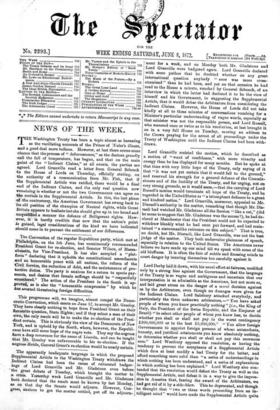Lord Granville resisted the motion, which he described as a
motion of "want of confidence," with more vivacity and energy than he has displayed for many months. But he spoke at that time with very little hope of the Treaty, only saying of it that "it was not yet certain that it would fall to the ground," and reserved his strength for a general defence of the Commis- sioners and of the lucidity of the Treaty, and for urging, not on very strong grounds, as it would seem,—that the carrying of Lord Russell's motion would terminate all hope of the Treaty, and be regarded in the United States as "a triumphant defiance to a great and kindred nation." Lord Granville, moreover, appealed to Mr. Diaraeli's authority in the matter, remarking that though Mr. Dis- raeli had watched Mr. Gladstone all the Session "like a cat," (did he mean to suggest that Mr. Gladstone was the mouse?), he bad de- clared at Manchester that the President could not be expected to withdraw blankly what he had once put forward, and had main- tained "a statesmanlike reticence on this subject." That is true, no doubt, but Mr. Disraeli, like Lord Granville, was not the beat judge of the matter. They both undervalue plainness of speech, especially in relation to the United States. The Americans never believe we have made up our mind till we speak with some of the old bluffness. It is often the fate of subtle and finessing minds to court danger by insuring themselves too carefully against it.


































